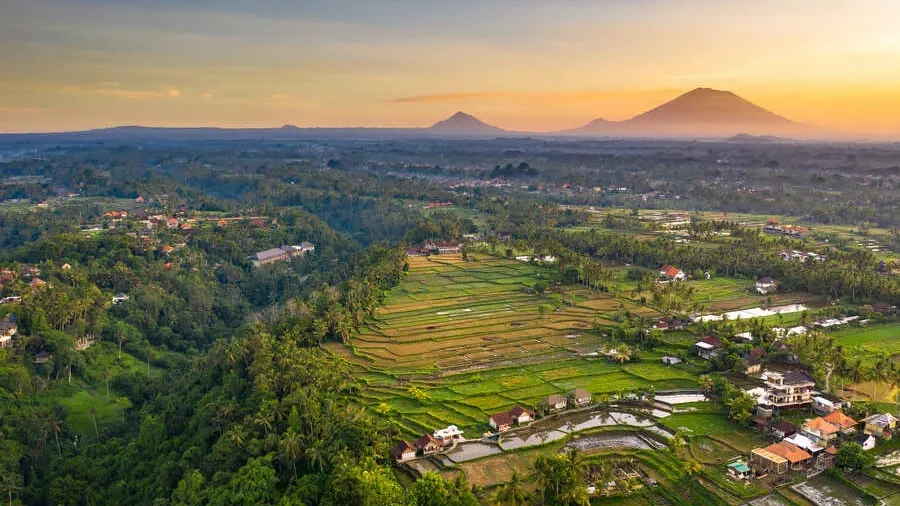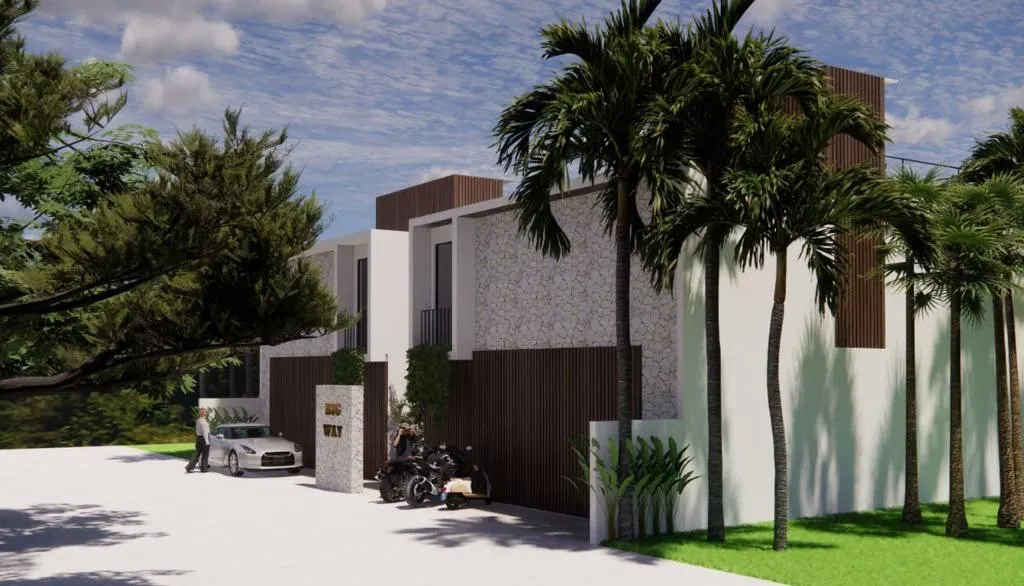


Real Estate Specialist
The dream of living in warm countries is not just an illusion, but a real possibility for many Russians. Bali is one of the popular destinations for a permanent move, and its popularity continues to grow. In this article, we will look at the main aspects you need to consider if you are planning to move to Bali in 2025. Now let's move on to more information about emigrating to Bali.
Inspiration and reasons for emigration
Moving to Bali is becoming increasingly popular among citizens of other countries. One of the most striking examples of successful emigration is the story of the famous Australian blogger and photographer Stefan. He moved to Bali in search of new experiences and opportunities for his creativity, moving away from the hustle and bustle of the big city and choosing a life closer to nature.
Stephan, sharing his experience moving and adjusting to Bali in his blog, has become a source of inspiration for many people around the world. His story confirms that Bali is a great place for those who want to change their lives and live in harmony with nature.
Bali is not only a paradise with white beaches and crystal clear sea, but also a place where you can fully enjoy eco-friendly life. The island is teeming with rainforests, rice terraces and volcanic mountains that create a unique and stunning beauty of nature.

Bali is also a place to discover new opportunities. Many expats go into business, open their own cafes, shops or yoga studios. Others are engaged in creative work, writing books, creating music or art.
In addition, living in Bali allows you to get away from the hustle and stress of the big city. Here you can slow down the pace of life, enjoy simple pleasures and really relax.
All this makes Bali a great place for those who want to change their lives and live in harmony with nature.
Preparing for the move
Moving to another country is always stressful, especially if it is moving for permanent residence. However, with proper preparation and planning, this process can become much less stressful and more manageable.
Learning culture and language: The first step in preparing for to move to Bali is to learn the local culture and language. Understanding the local culture will help you adapt more easily and avoid culture shock. And knowing basic phrases in Indonesian will make it easier to communicate with the locals.
Search for housingBali offers a variety of housing options, from low-cost guesthouses to luxury villas. It is important to decide on your place of residence in advance and take into account that the cost of living in Bali can vary greatly depending on the area and season.

Budget planning: Bali is a fairly cheap place to live, but you need to take into account all possible expenses: rent, food, transportation, medical services, insurance, and so on. Careful budget planning will help you avoid unexpected expenses and financial difficulties.
Job searchQuestioner: If you are not planning to start a business in Bali, you will need to find a job. Please note that foreigners need a special work visa to work in Indonesia.
Taking into account all possible difficulties and obstacles: Moving to another country is always associated with certain difficulties and obstacles. It is important to prepare in advance for possible problems, such as culture shock, adaptation problems, language barrier, etc.
Getting ready to move is a complex and time — consuming process, but with the right approach, it can be the beginning of an exciting adventure and open the door to a new life in Bali.
Visa issues
Moving to Bali requires a visa. Indonesia provides various types of visas, including tourist, social, business and work visas.
Visa on arrival: When arriving in Indonesia, you can get a visa for 30 days. This visa can be extended for an additional 30 days, but you will need to contact your local immigration office.
KITAS and KITAP visas: If you plan to stay in Bali for a long time, you will need a KITAS (work) or KITAP (pension) visa. Getting these visas requires more time and paperwork, but they allow you to live and work in Indonesia.

Visa-free entry: Citizens of some countries can enter Indonesia without a visa for up to 30 days. However, this regime does not provide for the possibility of extension and does not allow working in the country.
It is important to note that obtaining a visa requires some effort and time. You will need proof of your identity, financial status, and purpose of the visit. You must also pay a consular fee.
Always keep an eye out for changes in Indonesia's visa laws and, if possible, ask for help from visa professionals or consultants. Keep in mind that visa violations can lead to serious problems, including deportation and travel bans.
Long-term accommodation
For a long-term stay in Bali, there are several options.
Rental housing: You can rent a house for a long time. Most leases are signed for a year or more. Bali offers a wide range of rental properties, from cozy bungalows to luxury villas with a swimming pool.
Purchase of real estate: Foreigners are not allowed to own land in Indonesia, but you can purchase a leasehold right for up to 80 years. This allows you to become a full owner of a house or villas in Bali.
Important requirements and preparation for moving include::
Visa processing: You will need a visa for long-term residence in Bali. This can be a KITAS or KITAP visa, depending on your plans and circumstances.
Insurance: Health insurance is mandatory for all foreigners residing in Indonesia. Medical services in Bali can be expensive, so insurance can help you avoid unexpected expenses.
Documents for housing: If you are renting an apartment, you will need a rental agreement. If you are purchasing a property, you will need documents confirming your ownership.
Preparing for the move: Moving to another country requires careful preparation. You will need to plan your move, pack your bags, arrange all the necessary documents, etc.
Remember that life in Bali can be very different from what you are used to. Therefore, it is important to be prepared for new conditions and lifestyle.
Pros and cons of living in Bali
Life in Bali has its advantages and disadvantages. It is important to weigh the pros and cons before deciding to move.
Benefits of living in Bali:
- Warm climate: Bali is located in a tropical climate zone, so it is always warm and sunny. This is an ideal place for sun and sea lovers.
- Beautiful beachesBali is known for its beautiful beaches with white and black volcanic sand. Here you can go surfing, diving, snorkeling or just enjoy the sea and sun.
- Eco-friendly lifeBali is a place where you can fully enjoy life in harmony with nature. There are many tropical forests, rice terraces and eco-friendly places.
- Availability and variety of foodBalizian cuisine is known for its variety and taste. Here you can find dishes for every taste and budget.
- Local friendliness: Balinese people are known for their hospitality and friendliness. They are always happy to help and share their culture.
- Low cost of living: Living in Bali is relatively cheap, especially when compared to Western countries. Here you can rent good housing, eat delicious food and engage in your favorite activities for a reasonable amount of money.

Disadvantages of living in Bali:
- Difficulties finding a job: It can be difficult for foreigners to find a job in Bali, especially if you don't speak Indonesian or don't have special skills.
- High cost of medical services: Medical services in Bali can be expensive, especially for foreigners. Therefore, it is important to have health insurance.
- Infrastructure: The infrastructure in Bali is not always at a high level. The roads may be in poor condition, and public transport is not always convenient to use.
Maintaining well-being and security in Bali:
When moving to Bali, it is important to pay attention to your own well-being and safety. This includes maintaining a healthy lifestyle, following local laws and customs, and ensuring your own safety and that of your loved ones. Do not forget about the need for insurance, regular medical checks and compliance with safety measures.
Approximate prices for living in 2025
Predicting the exact prices of living in Bali in 2025 can be difficult as they can vary depending on various factors including inflation, economic conditions and personal needs. However, based on current prices and trends, the following estimate can be offered:
Rental housing: Rental prices can vary greatly depending on the location and type of accommodation. However, on average, for a one-bedroom apartment in the city center, you can pay about $300-500 per month. For renting a villa with a swimming pool in the city center-from $1000 per month.
Food: The cost of meals can also vary, but on average, a lunch in an inexpensive restaurant will cost $3-5, and a three-course dinner in an average restaurant for two will cost about $20.

Transport: Renting a motorcycle for a month will cost you about $50-70, renting a car-about $200-300 per month.
Services: The cost of Internet, mobile communications, and utilities is usually about $50-100 per month.
Entertainments: The cost of entertainment, such as going to movie theaters, bars, clubs, and gyms, may vary, but the average is about $100-200 per month.
The total cost of living in Bali for one person per month, based on these estimates, can range from $600 to $1,200 or more, depending on lifestyle and personal needs.
Conclusion: Opportunity to live in Bali and obtain a residence permit in 2025
Moving to Bali in 2025 is a very real prospect for those who dream of living in a warm land. Despite all the difficulties and disadvantages, Bali remains an attractive destination for emigration from Russia due to its unique lifestyle, beautiful scenery and friendly people.
It is important to remember that successful emigration requires careful preparation and planning. You will need time to learn all the nuances of life in Bali, including visa issues, finding accommodation, maintaining health and well-being, as well as overcoming the language barrier and cultural differences.
The dream of living in warm countries, the desire to change the way of life and enjoy nature, proximity to eco-friendly life, opportunities for business and creativity, escape from the hustle and stress of the big city.
An example of successful emigration: the story of Australian blogger Stefan, who found inspiration in Bali for his work and life closer to nature.
Bali is teeming with rainforests, rice terraces and volcanic mountains, creating a unique and stunning environment. Snow-white beaches and crystal clear sea are also its attractive features.
Many expats in Bali open their own businesses, including cafes, shops and yoga studios. Others are engaged in creative work, write books, create music and art.
Benefits include proximity to nature, opportunities for business and creativity, and the ability to slow down the pace of life and enjoy simple pleasures.
Learning the local culture and language, finding a place to live, planning a budget, finding a job (if you don't plan to start your own business), and taking into account possible difficulties and obstacles.
Learning a culture and language is important for easy adaptation and avoiding culture shock. Knowing basic phrases in Indonesian will make it easier to communicate with locals.
Bali offers a variety of housing options, and it is important to decide on a place to stay, considering the budget and area.
The budget depends on many factors, including rent, food, transportation, medical services, and other expenses. It is important to plan it carefully.
Problems can include cultural shock, adaptation difficulties, and language barriers.
Various types of visas are available in Indonesia, including tourist, social, business and work visas.
What are my reasons for moving to Bali?
The dream of living in warm countries, the desire to change the way of life and enjoy nature, proximity to eco-friendly life, opportunities for business and creativity, escape from the hustle and stress of the big city.
What stories of successful emigration are known in Bali?
An example of successful emigration: the story of Australian blogger Stefan, who found inspiration in Bali for his work and life closer to nature.
What are the natural beauties of Bali that make it attractive to live in?
Bali is teeming with rainforests, rice terraces and volcanic mountains, creating a unique and stunning environment. Snow-white beaches and crystal clear sea are also its attractive features.
What business and creative opportunities does Bali offer?
Many expats in Bali open their own businesses, including cafes, shops and yoga studios. Others are engaged in creative work, write books, create music and art.
What are the advantages of living in Bali compared to other places?
Benefits include proximity to nature, opportunities for business and creativity, and the ability to slow down the pace of life and enjoy simple pleasures.
What steps should I take to prepare for moving to Bali?
Learning the local culture and language, finding a place to live, planning a budget, finding a job (if you don't plan to start your own business), and taking into account possible difficulties and obstacles.
How important is it to learn culture and language before moving?
Learning a culture and language is important for easy adaptation and avoiding culture shock. Knowing basic phrases in Indonesian will make it easier to communicate with locals.
How to choose the right accommodation in Bali?
Bali offers a variety of housing options, and it is important to decide on a place to stay, considering the budget and area.
What budget is needed for living in Bali, and how to plan it?
The budget depends on many factors, including rent, food, transportation, medical services, and other expenses. It is important to plan it carefully.
What problems and obstacles can arise when moving?
Problems can include cultural shock, adaptation difficulties, and language barriers.
What types of visas are available for moving to Indonesia and Bali?
Various types of visas are available in Indonesia, including tourist, social, business and work visas.




























